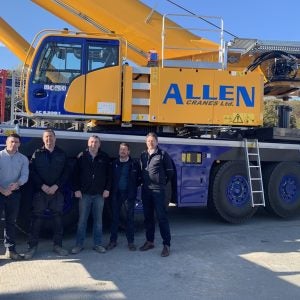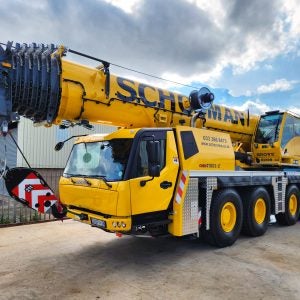Marsh Plant Hire became the company it is today in 1970. Having taken over the business from his father, Geoffrey Marsh terminated the distribution arm of the firm and decided to focus on hire. At the time, the business was still predominantly focused on earth moving equipment.
Its first cranes were a Coles 5t capacity Mk VII Series 7 EMA mobile (often referred to as airfield cranes) and a 7.5t Challenger S diesel electric crane, which it bought for GBP5,750.
“Around that time there was a plant exhibition at Crystal Palace and I said to my father that we needed another crane. He was conservative by nature and wasn’t sure. Victor Canum, who eventually became Coles sales director, said, ‘I’ll tell you what, I’ll sell you a second Challenger S crane but without a fly jib to save cost’, and we bought it.
“Then we purchased a Coles 12t, which was our first telescopic crane. The 4×2 version had 19t over the rear axle but we bought the 6×4 carrier and eventually sold it in mainland Europe as a 15-tonner.”
Marsh has acquired 15 companies over the years. “Every time we build the fleet to 100 cranes a recession strikes and we have to downsize. In 1990 we had 110 cranes but I had to stop ordering in the middle of the year, even cancelling the last 20t Kato unit. 1991 was even worse; I sold 23 cranes and only bought five new ones.
“Over the years, cranes have got bigger. Typically the way through a recession is to sell the smaller units. We’ve sold a lot of cranes to India and Pakistan. Two and a half years ago we had 25 Japanese 25t truck cranes; we’re down to 12 now. In 2008 we bought 16 new cranes at GBP4.5m. Now I have no new cranes on order and won’t look at that again until the middle of next year. We look to replace cranes once they are six-years-old.”
Marsh currently has a fleet of 65 cranes, which is down 11 on this time last year, and is operating at 68% utilisation.
“Everyone’s doing the same,” he says. “I’ve been to Liebherr and Grove events this year and everyone has reduced their fleets. The ones that haven’t have chosen to leave their cranes standing but have got rid of operators. Ainscough and Hewden Stuart, for example, are downsizing. Typically, the cranes go abroad but that’s getting harder because we’re in a worldwide recession. Dealers are simply not moving their stock. I know of three dealers who each have three 50t cranes in stock and they can’t sell them.”
Marsh, who was chairman of the Construction Plant-hire Association (CPA) mobile crane group, has vivid memories of the recessions of the 80s and 90s “but this one will be the worst,” he says. “I think people have underestimated it and we’re in for a very difficult 18 months. It’s going to be a difficult winter especially. Some companies who borrowed heavily will go out of business.
“July was better than June, which was terrible, despite being traditionally a strong month for us. Some house builders are starting to open up their sites again but the government funded work (NHS, schools, etc) is finished and there isn’t any more money to invest. There is Ministry of Defence work but the quantity of that will reduce.”
Marsh says his saving grace is that the business is not entirely dependent on construction. “For the sake of commercial confidentiality I can’t go into where we’ve found niche markets. Customers are phoning us up saying they’ve got to cut costs and in this business that doesn’t mean little by little, it means sometimes by a third. It’s ridiculous, but it’s always been the case and when the market does recover prices won’t go up with demand, they never do.”
Marsh has probably earned his retirement twice over, “but I’m ageless. I’ve got a 15-year-old son and I need to pay his school fees,” he jests. That said, Marsh has installed a management team, of which he is chairman, to cope with the day-to-day running of the business. Five years ago he named a managing director. “None of that management team are members of my family though; I don’t think business and family go together,” he says. It’s a surprising notion given the background of the company. “I remain hands-on and believe the business needs me to continue to make the strategic decisions.”
Marsh has seven depots, following the closure of Birmingham two years ago. “We’ve got an inventory at every depot to avoid travelling with the smaller cranes, which isn’t cost-effective. We’ve got coverage from Exeter-Derby-London, although we don’t do much in East London or Essex.”
Marsh Plant’s biggest crane is a Liebherr 130-tonner and the largest cranes in each depot range between that and 90t.






